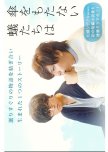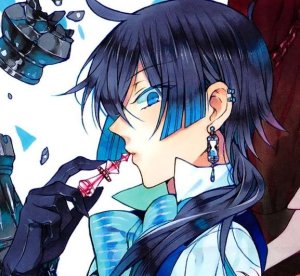
In the current jdrama and overall Asian media landscape, LGBTQ+ themes aren't the best represented. There are a lot of stories created to cater to fanservice rather than representation, and it's usual to find series and audiences that can't separate the two.
This series is incredibly well crafted, which is not only a credit to the manga that originated it but to the overall adaptation and the great performances by the cast, especially the leads. Each episode is centered on a specific meal (they even tell you how to cook it!), a meal cooked and prepared at home, which connects to the intimacy and the complexity of this couple, two men in their 40s who deal with their daily lives and their very different ways to handle their identities in their respective environments.
Shiro is a lawyer, he is reticent to coming out at work or to not be hetero-passing enough in public, at the start of the series. He is out to his parents, but doesn't speak too openly about things and overall seems a bit unsure still on how to present himself. Shiro could very well be the prototype of "unwilling" you find in BL dramas, in those in which consent is never clear and someone always has to say "no" to no avail. But he is not. Shiro is certain on his feelings and his relationship, but he needs to learn how to reconcile the different parts of his life in order to feel more sure with letting others know. He cherishes his relationship and is actually the one who marks most of the pace, there is nothing in him that isn't consensual, and conversation is a big part of the drama that lets him grow as a lead.
Kenji is a stylist, he isn't embarrassed to be flamboyant and open about his identity and his relationship. He could very well be the prototype of "flamboyant" and "feminine" in dramas, but he is not. He establishes in various instances the misconceptions of gay relationships, the difference between drag and homosexuality, the elements in presentation and gender dynamics. He is very taken by Shiro and isn't afraid to show affection, but he is also filled with self doubt and needs to learn how to communicate them better throughout the series, and how to reconcile his past with his present self.
The series is filled with moments throughout the life of these two, their encounters with other characters that will widen the lens, and you can see a lot of layers of the prejudice and complications of acceptance in Japanese society and the way in which they, and other couples, deal with those. It's a series that isn't devoid of its tear-inducing moments but it's not intending to be sad, dramatic or tragic, it's a happy story, and the leads aren't used for any sort of gratuitious emotional torture.
The food is not only great, and boy do I love dramas with a focus on food, it's also increadibly heart-warming and cozy and it provides a sense of the emotion and feeling you'll see on the episode and complements the story really well. And, meanwhile, you learn how to cook it.
I also immensely appreciate the fact that the couple is over 40, it really serves to discuss things that dramas centered on relationships almost never focus on. I feel that every time a drama focuses on a couple, it's going to be all about confusion and misunderstandings until a grand over-the-top ending. This one, though, is relatable in its simplicity and emotional depth, not only for those in relationships, but also those who are not but are still figuring out ways into adulthood in a couple of generations where the landscape of expectations and reality have changed so much. It isn't just about life in a relationship or life as an LGBTQ+ person, it's also about adult life in a very fast changing social landscape.
Overall, this was a perfect blend of a drama to me, the cast made it a great watch as well (one character has an actor change mid-way because the original had medical issues, but they pulled through really well regardless), and it's definetly great as one of those dramas you can come home to and relax watching, while also having a story that is compelling and emotional at times. I don't even hesitate giving it a 10/10, something I rearely ever do, but this one did it for me.
I can only hope there is a second season or something else from it at some point.
Was this review helpful to you?

What bothers me the most is that this has the ingredients to be a very good story. It's an arranged marriage in which both parts are taking something out of the situation, in which both parties come from very different backgrounds and have different priorities: Chiwa is a hardworking young girl who has to work two jobs to make ends meet while paying for her (terrible) father's gambling debts; Hokuto is a hardworking man with a very overwhelming family, who wants to succeed in business to uncover a family secret related to his past and take revenge. The premise is good.
Now, if we add to that every cliche from Josei manga you can possibly think of, that's when things go south. Hokuto is that kind of male lead who is downright a jerk and whose backstory is supposed to make you feel for him enough to forgive him for being a possessive toxic jerk. It doesn't work for me. Chiwa is a very interesting character in premise but the moment she starts getting ~feelings~ for Hokuto, we lose her. We have, however, a couple snippets of the Chiwa who should be, I can count at least 3 times in which she read Hokuto and his family for filth, and that is the direction I wish this would have taken. Furthermore, she has, like I said, a father who is constantly getting in debts and disregards her well-being, but instead of it being taken seriously, the comic relief they (think) they're turning him into transforms Chiwa's struggle into something less important.
To that dynamic, add every other thing you can fit in 12 episodes: love triangles (plural), betrayals, paparazzi drama, multiple near death experiences for various people, grudges with daddy, slut shaming, women hating other women on principle, weird family connections pulled in the last minute and making no sense, you name it, it's all there.
I can't help but compare this with Please Love The Useless Me because a) they're both based on Josei manga b) they both came out this year c) they both have the "cold male lead/cute female lead" premise d) they both have Dean Fujioka. And, in the comparison, Please Love The Useless Me wins by a landslide. The premise of that drama was much less interesting than this one, but the character development was good and it didn't retort to the same cliches to fill the story (no girls hating girls, no slut shaming, no evil ex-girlfriend with machiavellian plans).
If you don't like the same old josei premise as per usual, you don't like the male lead treating the female lead in a questionable manner, you don't like a plot that has everything but the kitchen sink and you constantly question yourself why the girl is doing this to herself, this is not the drama for you.
Was this review helpful to you?

I see this drama as Hotaru no Hikari with a sprinkle of Nodame Cantabile. There's the same sort of chemistry between the leads as in both but, unlike Hotaru no Hikari, I didn't find the lead unbelieving silly but, more like Nodame, just too kind, which some people look down on or take advantage of. When you see her for the first time, you think it's probably going to be a drama going around in circles but it's actually very direct. Kyoko Fukada is so versatile you don't know what you're going to find with her; her character, though too kind for her own good, is also very honest. Let me tell you, for a drama like this, that's actually refreshing.
But what I liked the most about this drama and the main reason I'm actually writing a review is the following: this is a romantic drama with love triangles and unrequited feelings in which none of the involved ladies take it on each other. They're not resentful, not vindictive and actually talk to each other about things other than the men in question. Heck, I even liked the relationship between the lead and her co-workers, which got developed from cliches that may have been unnecessary to something more realistic and interesting. There's a lot of ladies standing up for each other in this, I don't know if that's a merit of the manga which this is based of or not but hey, I'm so grateful.
All in all, I was faced with situations in which I thought the drama was intending to go towards a cliche and there it was, doing something else (especially with Shohei Miura's character). It's not devoid of cliches, mind you, there's a stern cold-seeming male lead saving a heartwarming cutesy female lead, but there's a lot in between I found absolutely worthy of my time.
Was this review helpful to you?

That being said, I don't think it was that bad. It isn't the most groundbraking suspense drama you'll find, it isn't the best written thing you'll see, but for the lack of experience these girls seem to have, the fact that it's "one of those idol dramas", the budget and the amount of episodes, I've seen much worse. To be honest, it's a very binge-watchable drama and it keeps the tension more or less throughout, so I don't regret watching it.
The plot starts in medias res, which I really appreciate in a suspense story, and I wish it had kept the focus it had on the beginning throughout the entire thing because, as the episodes advance, it gets unecessarily complicated for a story that didn't need so many unconnected twists and turns. And, for what I've seen in some comment threads, I'm not the only one left with more questions than answers when it's all said and done. I wish there had been one big focus instead of small things that have a common thread, kind of, if you squint.
Still, for all its complicated messes with the plot and its unanswered questions, it did leave me wanting to discuss it to try figuring out what just happened, and I consider that a good thing; I had left complicated dramas wanting to never look back in the past, but this is not one of those, at least. It's a mess but it's an interesting mess. And hey, I commend these girls for starting out with a suspense/horror/mystery drama rather than a typical school drama which would have probably hidden their inexperience a lot better but it would have been a lot less interesting to watch.
If you're looking for suspense with minimum to no gore, a sort of idol version of SAW, which will keep you wanting to know more, even if it's to try figuring out what on earth you just watched, and don't mind very inexperienced performances and some clear fanservice-y moments attempted to be disguised as representation (that's the idol industry for you, though, it's a general recurring problem), give this one a shot. And then DM me and tell me what you think just happened.
Was this review helpful to you?

First, let's get the main issue out of the way, I would have liked to see a trans actress in the lead. I think IVAN would have been perfect for this role. But even though I find the choice conflicting, I can't undermine how good the writing is or tear down this step forward, so I'm just putting it out there now.
Miki's story is inter-woven with introspective moments, and it doesn't shy away from showcasing violence, abuse, transphobia and heartbreak. Still, Miki is one tough lady and moves forward with her impeccable fashion style and her identity intact. Her relationship with once High School classmate Goto, who comes to live with her in her apartment, is a delight to see develop, as Goto learns more about Miki and what life is like for her. Goto is an amazing character whose masculinity is strengthened by his vulnerability and his openness.
My props to Sakaguchi Riko because the story handles the subject a lot better than I expected, especially considering it uses the right terms for everything (Miki identifies herself as a lesbian trans woman from the very beginning), something that does not happen usually in Japanese media. It's very common for dramas and variety shows to use the "gay man" umbrella for everything they think fit and trans women sometimes get involved in that. I can't say much about that because it's not my identity to give an opinion on but, from my perspective of an outsider, this drama shows it all very well and the storyline serves to include a lot of related topics, as well as other general identity searches, when it comes to life as a young adult, career, dreams and relationships.
It's a pity that it's just 4 episodes long, I hope we can see more of this series in the future.
Was this review helpful to you?

This story is focused on two characters: a young woman whose passion is knowing about fabrics and who moves to Ginza to start a job in an atelier (played by Kiritani Mirei) and a middle aged woman with a great career in the designing world and high standards for quality in the lingerie she creates (amazingly portrayed by Mao Daichi). When you see it at first glance, you might think it will turn into a The Devil Wears Prada scenario, and when the series itself starts with an argument on why do women try to look beautiful all the time, I feared this was going to be another drama in which the younger generation has to learn the traditions and cave in, even though they don’t agree with things (I’m watching HOPE at the same time, you see), but this drama surprised me greatly.
The main relationship in this series is the one between these two characters, who have two different ideas of what beauty really is and of what a woman wants to feel to be more like herself. There isn’t much romance in it (and whatever hints there are, they aren’t the focus) and it isn’t solely focused on the young character making her way through the world, there’s plenty about the perspective on mature women in the fashion business and how they are perceived at certain ages and what that means for them (mainly in the character of Nanjo Mayumi), on how competition between women is sought for and turns out being detrimental to all involved (for example with Fumika, Mizuki and Sarii, among others) and how, even in positions of power earned by hard work, women still don't have the freedom to choose as much as they would want to (like the editor and the reporter of Conscious Magazine).
My favorite thing is that they don’t talk about beauty as a single concept. Yes, the lead has to go through the process of looking less rough and more fashionable, and she also has to start getting along with how the fashion industry works, but there’s a lot here on creativity, integrity, customer importance, self expression and the painstaking task of being a woman who wants to succeed solo in Japanese society and the isolation that can create when it becomes opposed to the personal life they’re supposed to carry on with (aka husband and kids).
I didn’t give this one a rating as high as Mondai No Aru Restaurant because I feel there’s more stuff that could have been addressed and wasn’t (for example, I felt that the lead's relationship with one of the female models had more chemistry than with the couple guys they tried to hint some sort of thing with, that could have gone places), whereas Mondai No Aru Restaurant covered a lot of aspects with their story, but this is certainly another one of those great ones and I hope there’s more like these in the future. After so many naive and mistreated leading ladies with jerk male leads with inexcusable behaviors, I really needed a drama like this, in which female characters showcase their true worth.
Was this review helpful to you?

1) If you're watching this on Netflix, you're covered, because it lists this special as a 13th episode, so it won't play before the drama; but if you're following the descriptions on various sites calling this special a "prequel" and think you should watch it before the drama: DON'T. This is a prequel, of sorts, but it's meant to go AFTER you've seen the drama, otherwise you'll get massively spoiled.
2) If you think this will shed any light on the events of the main drama...yeah, no. It does tie some things together and sets the tone for some things the drama only describes, since it's set before the main conflicts leading to the drama take place, but it's not going to answer your questions, maybe generate more.
That being said, I don't think this special was really necessary, in the grand scheme of things, so I'm giving it a lower score than the drama, but if you have it available and saw the drama, give it a go anyway.
Was this review helpful to you?

I have to say that, overall, I enjoyed the movie more than the show.
The movie was able to successfully continue where it left off, when it comes to the main couple, instead of falling back on the same narrative the show used. The debacles of the series, the doubts about identity and the nature of the relationship, are gone from this, and Haruta and Maki have issues and concerns that, even if still rooted in their characterizations and instances of miscommunication, respond to a plot advancing and not falling behind on safe paths already done by the series.
The two characters that arrive, Shison Jun’s and Sawamura Ikki’s, are a lot more amenable than I thought when watching the trailer, and their natures develop throughout in unexpected ways. Both are good actors, so that lifted up the standard.
My biggest issue with the show (maybe it’s just me) was the boss’ character. I felt that using comedy derived of lack of consent situations and a caricature of homosexuality didn’t work in this show, although I understand that it might have been a safer bet to include a caricature instead of outright dealing with lgbtq+ subjects in the open, without the “satire” persona to distract some audiences. This is also why I skipped the Sky series, because the part they kept was this dynamic.
In this movie, it’s less bothersome. It’s not gone, but it’s not as bad. At first, it was going really well, and I realized that, as long as they allowed the boss to have his own narrative, it may be alright. But they couldn’t let go completely from this shtick, and to do so they had to retort to very nonsensical camp, which didn’t ruin the movie but, considering there was SO MUCH MORE going on, I have to ask if it was really necessary.
There are tropes, yes, but I feel that this movie took the fact that it is an mlm piece of media more seriously than the series, which allowed Haruta and Maki to have conversations in which they realistically put out there the limitations that Japanese society would set if they want to “marry”. So far, I've seen this only in jdramas like What Did You Eat Yesterday?, while much of what is considered “BL content” just leaves it at a ring and vague promises, which is what the series was going for. The fact that they talked about it, that their future together was realistically explored to an extent, made me feel that they took themselves more seriously and that the show is standing firmer on the subjects it portrays. Without losing nonsense and comedy and all that stuff people like about the series.
The female characters are a bit lost in this one. One thing I liked about the show is that they had very good female characters, which is something regular "BL" storylines lack of. In the movie, some of them show up but not as primarily as in the series. It can be understood, though, because of the lack of time (I’ll leave out the discourse on Kaneko Daichi barely scraping legal age between the series and the movie and the relationship they put him in). I really liked the character of the chairman’s daughter and wish she would have been treated better, but we can’t have everything.
I don’t think the histrionic moments and overall energy of both the series and the movie are for everyone, but the movie gave the series the step forward it needed, introducing more substance to the main relationship, which I genuinely wish had been even more focused. Because even as a step forward from series one and advancing in its narrative, there's still hesitance towards abandoning certain “safe” tropes, and the movie didn’t need some of them. When you have the personal relationship issues submerged in a) new characters that are important for the plot, b) the boss’ antics being partially back, c) the campy plotline that has genuine emotional moments but also explosions and guns, d) most characters from the series showing up at some point or another; you wonder if maybe the audience would have responded to it just as well with a little less of all of that and a little more of the core relationship that has become so interesting and refreshing.
Because it’s refreshing to see, even with all the camp and nonsense, a relationship between two people in their late 20s/early 30s figuring out life as they go and their identities as well. That’s the heart of this series, I feel like. And it works because both Haruta and Maki as characters work together. Even if Tanaka Kei is sometimes at a 10 for too long.
All in all, I enjoyed it, more than the series, and I’ll probably watch it again. If you liked series 1, I think this is a must watch for you. If you want more down-to-earth-dramatic type of dramas and you are not familiar with or fond of jdrama humor, it might be a complicated one to navigate, but it still has genuine moments I think you’d enjoy.
If they want a series 3, or another instance of this, they better continue where this left off and ditch the AU ideas, because this is where it’s at.
Was this review helpful to you?

The lives of Maikos and Geikos have often been represented by external gazes, and they were done wrong many times by international eyes who saw in them what they wanted to see rather than what was there. This drama has the ability to showcase a traditional practice in a day-to-day setting, letting us see the domesticity, the relatable bits, the inner story of a Maiko house.
This is less about painting a grandiose image and more about showcasing daily lives, with the core of the story being two friends from Aomori (Kiyo and Sumire) who decide to move at age 16 to become Maiko. However, and very early on, Kiyo finds herself in a different journey, the one that gives the title to the drama: she discovers the role of a Makanai, a cook who prepares home-made meals for those who work in the house (and maybe also, through that, provides unconditional love and support).
With a masterful grace similar to dramas like Kinou Nani Tabeta? and Shinya Shokudo (and, less successfully, others like Lunch no Akko-chan or Ando Natsu), this drama is successful in writing the complex through simplicity and narrate a compelling story (in this case, a coming of age story) in a setting that is inviting, welcoming and that has inspiring cooking scenes.
The relationship in the center is the friendship between Kiyo and Sumire, which is incredibly refreshing to see. I'm very thankful for dramas that have come out of late which allow for more than just romance in its core. Still, there are a lot of characters with their own journeys (successful Geikos with life crisis, retired ones who deal with balancing their blood family and their work family, old apprentices who struggle, new apprentices who also do, retired Geikos who come back, family members of people in the house who don't share the traditions, etc.).
The only critique I'd give is that some elements of narrative tension, some thing that seemed would go somewhere, didn't quite have the space to develop. I can only hope that this is like Shinya Shokudo and we get more of it, but only time and people's engagement will tell.
If you're looking for a fast-paced, action-packed, tragedy-filled drama, this one isn't it. But if you're looking for a relaxing, domestic, coming-of-age drama with traditional elements and amazing food, a drama that you can come home to, then give this one a chance.
Was this review helpful to you?

Before starting let me just put out there that I haven't read the manga yet, so this review is solely based on the drama. However, I'll point out that the drama does a good job of making people want to read the source material, if they haven't.
This story starts in an aftermath, where many stories would end. You have a divorced father, who recently lost his twin brother, a little girl navigating her parents' separation and a widower brother-in-law who comes into their lives for the first time, after his husband's passing. Still, even though the events that lead to this setting are sad and filled with regret, the drama is not centered on that, but in the re-building of a family and the search of happiness.
The drama could have gone melodramatic so easily, and it could have used the subjects it portrays for gratuitous suffering, but it never does. It deals with stuff like bullying, homophobia, grief, separation anxiety and letting go, but it always does so respectfully and with emotional maturity.
It could have also turned preachy or superficial, considering that Yaichi (performed by Sato Ryuta) isn't gay and is left to understand the life of his brother who was, and to navigate his relationship with the brother-in-law he is meeting for the first time. Yaichi, being not only the protagonist but a kind of ambassador to Mike, who is a foreigner and a stranger in many ways to their community, could have very easily turned into a 'ally savior' trope. But there are well crafted elements throughout the story, instances of development and conversations with Mike and other characters, that allow for this show to be a great combination between a mature lgbtq+ narrative, a wholesome family story and a way to put out there subjects into conversation that the audience the drama was aiming to might have not seen in this way before.
Also, absolute stand out thing to me that I was not expecting is the way in which Yaichi's relationship with Natsuki, his ex wife, was written and performed. It's complex yet very simply human but it's not demonized or made into a him vs her situation with their daughter in the middle, like a lot of dramas with divorce tend to do.
The kids in this are adorable, btw.
All in all, wholesome, bittersweet yet with a positive spirit and an ultimate message of family, I would absolutely recommend. The only bad thing is that it's only 3 episodes long.
Was this review helpful to you?

My biggest issue with this drama (apart from the fact that I’m not a fan of leads who act like jerks and who we’re supposed to find romantic rather than toxic) is that the story is all over the place. There’s a story-line involving the three brothers, with a mystery in the middle, which gets resolved halfway through and ends up going nowhere. There’s a story-line about the restaurant they have and trying to make it succeed while not selling out, and it also ends up going nowhere. There’s a story-line about the female lead’s quest for professional growth which ends up only serving the “romantic” story-line. There’s a backstory of a character to make them less two dimensional which also ends up going nowhere. All in all, it’s like every ingredient which could have turned this into less of a cliche and more innovative was pushed aside in the benefit of the overused story-line of the love triangle.
Out of all the characters, the only one I found memorable and whose performance I enjoyed enough was Nomura Shuhei’s Touma (the youngest sibling). He’s the only one I feel has a story arc which involves making personal changes, realizing mistakes and repairing damages he has caused. The rest, I can’t say much. It seemed Miura Shohei’s character was going towards a reasonable development and in the last few episodes his entire character turned 180° for the sake of the cliche romance. It seemed that Kiritani Mirei’s character had more substance to her than being the sweet main lead who tends to be too kind for her own good, but all about her drive and career seemed to just serve the cliche romance.
And Yamazaki Kento’s character deserves a paragraph on his own. He is the jerk male lead, the one we’ve seen at least 4 times this year: we saw him in Dean Fujioka’s Mamiya Hokuto in Happy Marriage, in his Kurosawa Ayumu in Please Love the Useless Me and in Shiraishi Shunya’s Uehara Hisashi in Good Morning Call. I really dislike this trope, I think it’s toxic as heck, but the rest of the dramas at least tried for me to feel for the guy. They intended to introduce a backstory (mostly tied in with family grief) in which I could say “oh, so this is why he’s a jerk”. It never worked, but they tried. Here, everything that happens to this character, all the troubles and external arcs to change him, happen in the timeline of the drama. There is no reason why he acts this way and he doesn’t change his attitude with anything that happens to him. He has that kind of extremely subtle character change which stans of him will call development but I call bad writing.
The reason why this drama isn’t my complete least favorite of the bunch is because it’s very nicely filmed and, mostly, decently performed. The shots were brilliant and they paid attention to detail, the cinematography was very enjoyable. There are some things in the story I found interesting, like the family mystery I mentioned, the somewhat complex way in which they tried to introduce the “ex girlfriend” cliche and the youngest brother’s character growth. But it doesn’t have enough to be different from the rest of the dramas with the same trope.
All in all, if this is a trope you enjoy and male leads being jerks is your thing, for some reason, this is a very well done one of those. If you’re looking for something innovative, different and devoid of love triangles, dates in aquariums, firework festivals being a “big romantic deal” and lots and lots of misunderstandings and “I hurt you because I want to protect you” scenes, there’s not much here for you. Except for an omelette with a burger inside, which is pretty good.
Was this review helpful to you?

Now, let's move on to the specifics. As far as I'm concerned, the book this drama is based on groups 6 short stories, which are unrelated to one another. This drama uses, in one way or another, 3 of them (the protagonists of the drama being characters from the last story) and make a small reference to another story, which is not fully covered. The other two are, as far as I can tell, nowhere to be seen. So, if you read the book, don't worry, you don't yet know how this is gonna turn out because the plot twist in this drama has nothing to do with the book.
I find it strange that, being the actual writer of the book involved in the drama (and performing in it), he'd choose to make such big changes as to end with a resulting different story than any of the others, but maybe it was taken as an opportunity for people who had read the book to still be surprised and for people who haven't to still have a chance to read it and find out other perspectives. Still, I find the resulting story of this drama a bit lackluster in comparison to the ones in the book, in the sense that the plot twist of the drama is not the most unpredictable one you'd see, which contrasts with a story that was pretty heartfelt and trying to be very honest.
I enjoyed the performances, especially from Renn, and I think the drama is enjoyable as a whole, yet it may have benefited from either following the self-conclusive aspect of the short-story style the book has, picking one and going with it from start to finish or providing more episodes for this style they chose to really take flight. As it is, I like the idea of the "stories inside a story" style they pick for the first part, it's a good narrative device when used well, but being the amount of episodes so little, I found the change of perspective a bit forced and it didn't allow the self-discovery and emotional-fulfillment aspect the drama was trying to go for at the end to fully show.
There is a speck of LGBT representation in this drama, not as well handled as in other dramas of 2015 I've seen, but it is there and it's more than just a BL-ish fanservice note, it has to do with character development, so it's worthy of noting. In the book, though, the outcome of that character seems to be better.
All in all, it's an interesting format and it deserves a go. It has a bit of mystery, a bit of fantastic and a lot of emotion. To me, it was interesting in a narrative level, as to see the use of different devices and how that worked (or didn't). I'd like to see what other stories can Shige bring in the future.
Was this review helpful to you?

The story revolves around a group of women who start a restaurant led by Tanaka Tamako (played by Maki Yoko) to fulfill the dream of a friend who suffered humiliating abuse at work, to the extent of leaving the city and her career because of it. Each woman represents a different story line centered on the struggles of women in Japanese society: Tamako is a great asset in a company but is overlooked and disrespected for being a woman, Kyoko is a divorced mother whose husband, after years of mistreat, wants to take away custody of her son, Nitta is college graduate overachiever whose qualifications never seem to be enough to get her the respect she deserves in a job, Nanami is a retired career woman (whose job I won't say because it's a surprise) lacking incentive to get back to the world, Chika is a hikikomori suffering severe social anxiety with terrible parents, Haiji is a transgender woman facing the backlash of society (note that there's still not a very clear differentiation between gay men, transgender women and crossdressing men in Japanese media but for all intents and purposes I believe Haiji's character is depicted as a transgender woman rather than a homosexual male, although lacking an explicit categorization) and Airi is a young woman facing a severely sexist environment at work and dealing with internalized misogyny.
This drama tells their perspectives while throwing at you unabashedly how much crap they have to put up with from the sexist society they live in. They encounter men who despise them, men who fear them, men whose ignorance they end up mending a bit, and men who support them (though those are rare). But the story, even though centered on this competition, is more about them and how they learn to deal with it by supporting each other. If you're looking for romance, this is probably not your drama, because couple tropes here are turned around. If you're looking for nice looking ikemen with charming personalities, this is not your drama, because men here are not the point of the story. If you're looking for female friendship, girls supporting girls and great food created as a result, this is the drama for you.
This drama has probably ruined dramas for me. In a good way, if that makes sense. I've had my fair share of dramas in which problematic tropes and social themes get discussed (Hanawake no Yon Shimai and, in a smaller degree, Five Star Tourist, are some examples), but this one did not hold back at all. It reads Japanese social standards for filth. Before this drama, I overlooked overused tropes with problematic notions because "that's how jdramas are" and "I guess that's how society is", even if I was against them and sometimes downright turned off by them so much to stop watching or avoid some dramas for it, but I somewhat expected them to be that way. I expected the toxic relationships being romanticized, I expected the submissive lead to hold her head down, I expected the good-looking-bad-tempered man to treat the lead possessively and make her swoon for that aggression, I expected the use of the "nice guy" as a way to excuse behavior and do outright stalker-ish things which were seen as "romantic", I expected the "crossdressing man trope" to be used for comic relief or fanservice rather than talk about the problems of actual transgender people in Japanese society, I expected the lead to find her place in life by either exceeding in a company and cutting all links to emotions or leaving it all for a husband, I expected all that stuff. This drama showed me they don't have to be like that. You don't have to expect that kind of stuff anywhere. There are better ways to tell a story, more empowering ways, well written and well performed ways. You should ask questions and get upset and demand more. This is the kind of drama I want to see more of and the fact that it didn't get even considered in last year's poll here makes no sense to me.
Was this review helpful to you?

This review may contain spoilers
This is a very particular drama and not really what I was expecting when I came across it the first time. I haven't read the novel, so I don't know how it's constructed, but the drama doesn't quite follow the kind of format you'd think when you read the description. From the main plot, you'd think this is a story focused on Yazaki Rio, where these other girls and their situations with this mysterious man are secondary, but it's the reverse, for the most part. You know more about these women than you do about the protagonist, and her own story unravels slowly throughout the series, ending in a cliff-hanger that I assume is setting the story for the movie that follows. The premise of the drama is developed as a multiple perspective story, where each of the girls (A to D) get 2 episodes each focused on them (the drama has 8 episodes in total), while small parts of the protagonist's story get shown along the way. Each of the girls is reduced to represent a character archetype for Rio to write her drama about, but reality tends to exceed these limitations and even if Rio's perspective most times seems to remain objective, the girls suffer from great changes in their lives prompted by these situations, but which ultimately have to do with themselves and their life choices, as well as their friendships and relationships.
Even though I find the direction of this drama very good and very distinctive, I felt it at times confusing to follow because of how it was filmed and how transitions and back-and-forth elements were disclosed. Maybe it was the intention, to keep reality and fiction blurred, so I can't fault it too much for that.
The leads are represented as flawed girls rather than plain characters, which I applaud in a jdrama. It represents elements of reality in different perspectives while keeping the characters less idealized, as dramas tend to do, and more flawed and complex. They all make mistakes, they all have to face them and you are at times shouting at the screen for some of the things they do, but it engages. The meta element of this being a drama within a drama makes this opposition of "plain archetype characters" and "real life flawed people" a very interesting thing to see set in this way.
I also feel that the marketing for the drama could have been better, because if the whole situation with who the E woman was would have remained secret, it would have been a really good plot twist, but the posters and public releases already give that away.
All in all, it's an unexpected, different sort of drama that takes a cliche premise and deconstructs it in very interesting ways. If you're looking for something more straightforward, with a steady plot that's focused on one character's journey, this is not your thing. If you're, however, looking for something different, a bit meta and very interestingly filmed and scripted, give this one a chance. I hope that the movie that follows stays interesting as well.
Was this review helpful to you?

It’s one of those dramas that have the structure in which a lead has a specific standpoint in life so, in every episode, they get to influence positively a member of the cast in escalating difficulty to deal with; like Mother Game, Kirawareru Yuuki, etc.
In this case, the setting is a company workplace, specifically of web design and maintenance, and as you can probably guess there’s room for a lot of comparisons between how people used to work and how people work nowadays. There are about 3 or 4 generations of employees depicted in the drama, and the differences between work ethics are interesting to watch.
Thankfully, this is not like HOPE, where the aim was to wax poetic about an older working practice, here every perspective is explored and ultimately the drama focuses on people’s wellbeing and the exploration of why Japanese society is so work-focused, to the detriment of people’s health at times.
The cast of characters is interesting, although there wasn’t enough room in the drama for all of them to be as showcased as they could have been. Normally, in these types of dramas there isn’t a romantic aspect underlying and if there is, it’s very minor, so that the plot can focus on the characters and their development. This one, though, has a sort of love triangle happening, which isn’t developed enough to consider it the main element of the drama, but it isn’t minor enough to not take a part of the plot.
The handle of that "romantic" aspect, if we can call it that, wasn't the best. Some decisions seemed to come out of nowhere and some plot devices used to further it along seemed rushed, which may have to do with the inability to adapt everything from the source material in 10 episodes. I don’t really care much about romance, so it isn’t a problem for me, but I felt that some decisions regarding the male characters and their actions lacked background information and seemed underdeveloped, in a narrative sense.
Yuriko Yoshitaka does a very good job as the lead, in a role that could have really influenced the whole thing negatively had the actress not been good or had they chosen someone who has a type-cast and would influence the audience’s perception easily. She really carries through the energy of the drama and works very well with her whole cast.
My favorite scene, acting wise, goes to Dori Sakurada, Yuuki Izumizawa and Yuriko Yoshitaka , their scene disclosing Shu’s past and Kurusu’s present was my favorite in the drama.
Overall, this one was good. It touches on heavy subjects at times, but never loses its hopeful spirit and does leave you with a good message and the idea that working expectations are changing and should be revised. That things regarding work don’t just have to do with obligation and money, but with an overlying cultural education and social construct around it, which applies differently to everyone.
Was this review helpful to you?




















